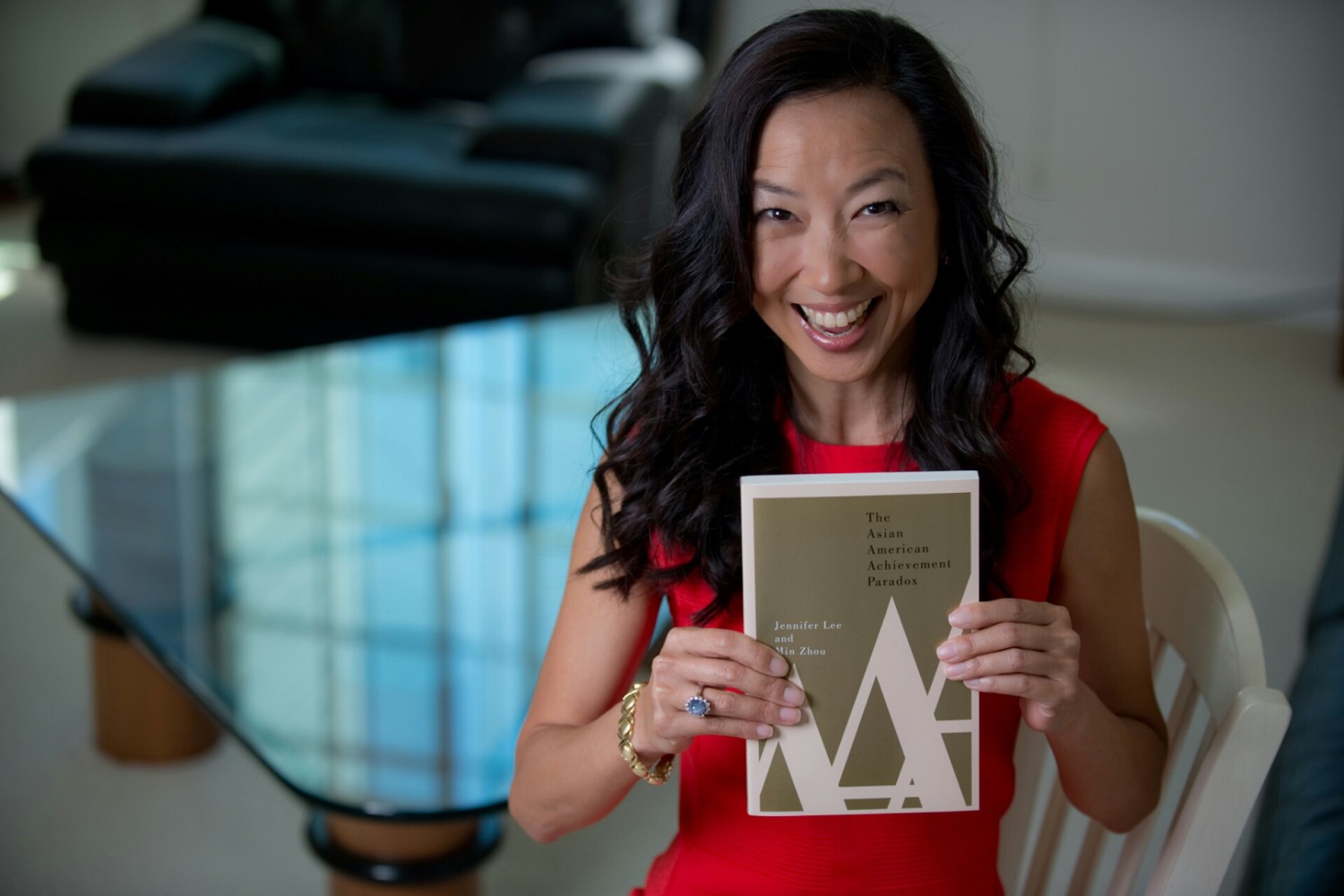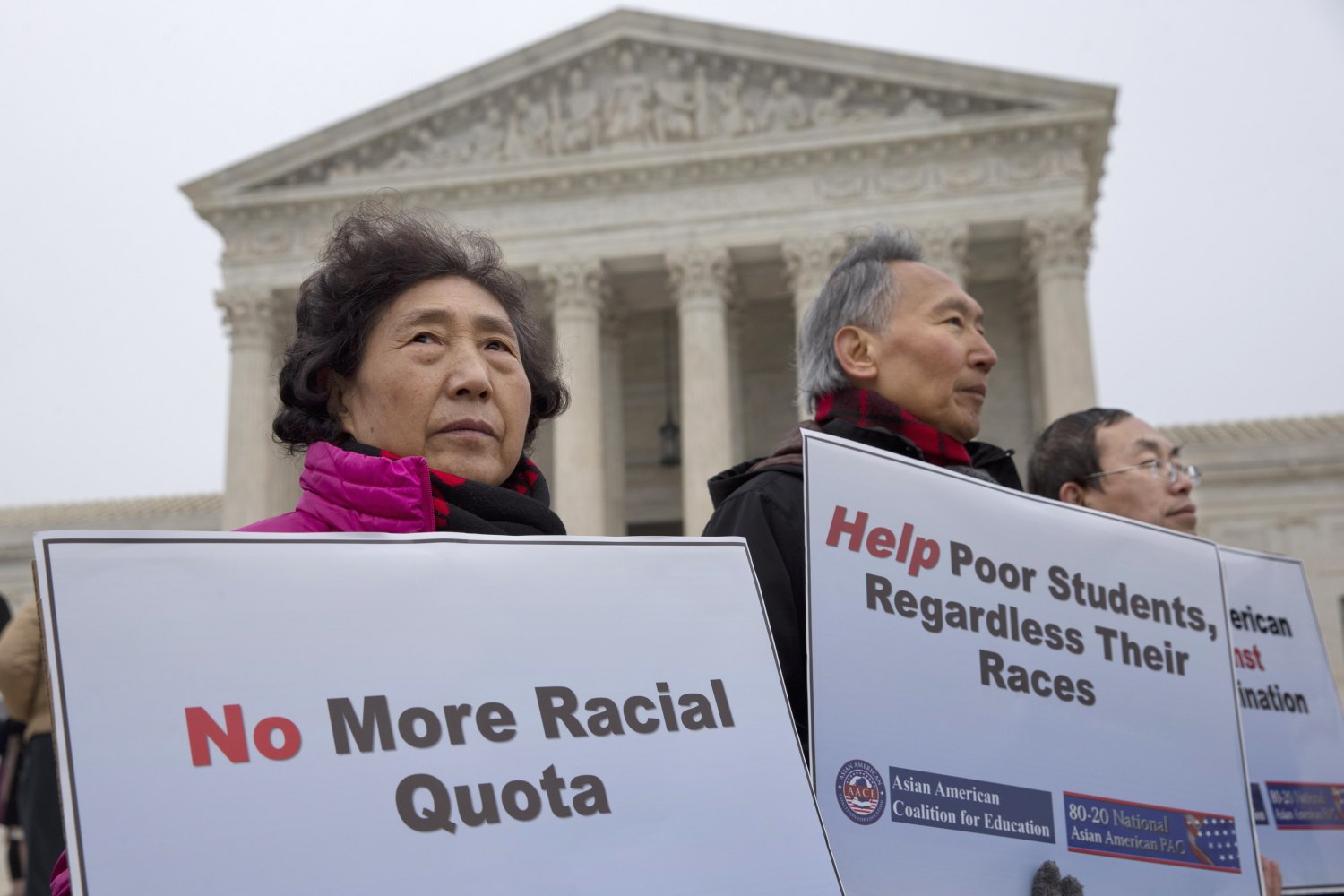Lee said Asian Americans should be supportive of polices like affirmative action because, at some point, they may need them.

UC Irvine professor Jennifer Lee with a copy of “The Asian American Achievement Paradox,” which she co-wrote with UCLA professor Min Zhou. Courtesy of Jennifer Lee
by EMIL GUILLERMO
NBC News, 12/10/15 — As oral arguments began this week in a Supreme Court case that could deal a blow to affirmative action, sociologist Jennifer Lee says she hopes Asian-American parents who are against the concept realize that it represents a net positive for the Asian-American community.
In a book published this past July, “The Asian American Achievement Paradox,” Lee, a sociology professor at the University of California, Irvine (UCI), and Min Zhou, a professor at the University of California, Los Angeles (UCLA), suggest Asian Americans shouldn’t blame affirmative action for perceived injuries, but instead embrace the policy.
“They think it’s in their self-interest to fight affirmative action,” Lee told NBC News. “But [it is] only in a very narrow way, without thinking of their broader life course. We need affirmative action because we don’t have the institutional advantages we think we do.”
Lee pointed to 2014 data from the National Asian American Survey that shows the majority of Asian Americans—69 percent of registered voters polled from California—supported affirmative action.
“This may come as a surprise because there has been a small, but highly organized, vocal minority who opposes it,” Lee said. “What’s important to note is that the second generation are more likely to support affirmative action than immigrants, most likely because the former understand how race affects their life chances, even as they attain high levels of education.”
“THE BETTER QUESTION [ISN’T SELF-INTEREST, BUT] WHETHER ASIAN AMERICANS ARE WILLING TO RECOGNIZE OUR ETHNIC AND CLASS DIVERSITY.”
Lee said Asian Americans should be supportive of polices like affirmative action because, at some point, they may need them. In that sense, whether affirmative action is in one’s self interest is not as important as the broader picture, she said.
“The better question [isn’t self-interest, but] whether Asian Americans are willing to recognize our ethnic and class diversity,” Lee said. “Not all Asian ethnic groups are highly educated and high-achieving; in fact, most aren’t. For those who face ethnic and class disadvantages, including Cambodian-, Laotian-, and Hmong-Americans, affirmative action policies will help. It will also help high-achieving groups like Chinese-, Indian-, and Korean-Americans to experience racial and ethnic diversity and better prepare them to work in diverse workplaces.”
RELATED: More than 160 Asian-American Groups File Briefs in Support of Affirmative Action
Lee also said that it’s a misconception that if race is not considered in college admissions, more Asian Americans would be offered admissions in places like Harvard, adding that race-blind admissions would probably give more advantages to others with privilege, such as the child of a legacy or someone from an underserved geographical area.
“Affirmative action policies allow universities to consider the differential starting points while also promoting diversity on campuses,” Lee said. “It creates a learning environment that better prepares students to be productive members of the increasingly diverse labor market and society. Thus, Min Zhou and I have argued that affirmative action policies benefit students of both high and low socioeconomic backgrounds.”

Guixue Zhou of North Potomac, Md., left, and others, protests against racial quotas outside the Supreme Court in Washington, Wednesday, Dec. 9, 2015, as the court hears oral arguments in the Fisher v. University of Texas at Austin affirmative action case. Photo by Jacquelyn Martin / AP
Beyond years in college, Lee also said the value of affirmative action may be significant in a professional setting.
“Asian workers may be perceived as smart and hardworking, but they are also perceived as lacking leadership skills, creativity, and managerial bravado,” she said.
Lee pointed to a May 2015 study by the Ascend Foundation, a non-profit organization dedicated to fostering business leadership in the Asian-American community. The study found that while Asian Americans made up 27.2 percent of professionals at Google, Hewlett-Packard, Intel, LinkedIn, and Yahoo, only 13.9 percent of executives were Asian-American.
“DIVERSITY MATTERS, AND INSURING DIVERSITY IS CRITICAL FOR ALL, NOT JUST CERTAIN GROUPS.”
“Even in the field of education, where Asian Americans are overrepresented, they are severely underrepresented in leadership positions at the department and university levels,” Lee said. “They make up less than 1 percent of corporate board members and about 2 percent of college presidents. Asian Americans may be facing a ‘bamboo ceiling,’ not unlike the glass ceiling that women face. How to break down that ceiling? Affirmative action, of course.”
Lee said her research with Zhou was started to bridge the gap in the debate between those who see Asian-American success as culturally-based versus those who see it as based on overcoming various institutional barriers.
“My goal is to present our research in a way that gives the audience the analytical tools to think critically about the dynamic relationship between immigration, race, achievement and affirmative action,” she said.
My interview w/@MorningBriefing @SIRIUSXM: #AsianAmericans, myself included, benefit from #AffirmativeAction https://t.co/bg38lQYPpI
— Jennifer Lee (@JLeeSoc) July 28, 2015
Lee and Zhou’s book was cited in an October op-ed by New York Times columnist Nicholas Kristof that some Asian Americans criticized for promoting a new version of the “model minority” idea. Lee, who doesn’t buy into that stereotype, wrote a rebuttal for CNN in response to Kristof’s column.
“Asian Americans are the most socio-economically diverse group in the U.S., which means that their views of affirmative action will also differ,” she said.
In one portion of the research, Lee and Zhou showed that some lower-income Asian Americans were able to overcome class disadvantages by using what they called “ethnic capital” — the communal knowledge, practices, and institutions created by better off peers to help others within their ethnic group. It includes academic enrichment and tutoring programs, Lee explained.
RELATED: Editorial: The Source of the ‘Asian Advantage’ Isn’t Asian Values
“Those [communities] with larger middle classes are in position to leverage their education and financial resources to create it,” Lee said. “But other groups like Mexican immigrants remain disadvantaged. Not all groups have access to the same type of ethnic capital. This is why affirmative action matters.”
https://twitter.com/NCAPAtweets/status/674619403711946752/photo/1
Whether affirmative action survives another test at the Supreme Court, schools are recognizing on their own the importance of more traditional capital in diversity efforts. In November, Yale and Brown both made commitments to diversity on their campuses. Yale said it will devote $50 million to retaining and recruiting a diverse faculty, and Brown said it would spend $100 million.
“The racial tensions that have come to light on campuses across the country, and the students’ non-violent protests show that race continues to matter in the lives of university students, even for those who are on the country’s most elite campuses,” Lee said. “Students, faculty, and universities have made their positions clear: diversity matters, and insuring diversity is critical for all, not just certain groups.”








